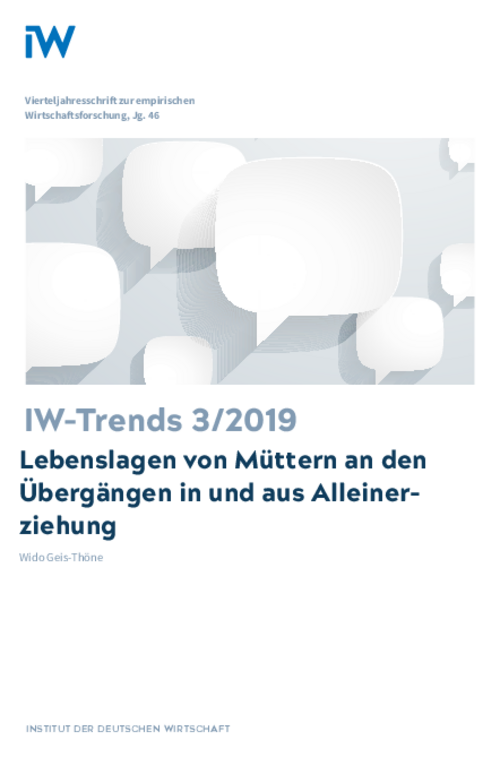The fact that the circumstances of single-parent families are significantly less favourable than those of couple families is widely documented in the literature. However, two aspects of this phenomenon remain little explored: firstly, the extent to which the absence of the second parent in the household is responsible for these circumstances; and secondly, the fact that mothers in different life situations separate from their partners and enter into new partnerships after phases of single parenting with different degrees of frequency.

The Life Situations of Mothers Transitioning Into and Out of Single Parenting

The fact that the circumstances of single-parent families are significantly less favourable than those of couple families is widely documented in the literature. However, two aspects of this phenomenon remain little explored: firstly, the extent to which the absence of the second parent in the household is responsible for these circumstances; and secondly, the fact that mothers in different life situations separate from their partners and enter into new partnerships after phases of single parenting with different degrees of frequency.
The fact that the circumstances of single-parent families are significantly less favourable than those of couple families is widely documented in the literature. However, two aspects of this phenomenon remain little explored: firstly, the extent to which the absence of the second parent in the household is responsible for these circumstances; and secondly, the fact that mothers in different life situations separate from their partners and enter into new partnerships after phases of single parenting with different degrees of frequency. In the present paper, these transitions are examined using multivariate analyses based on the Socio-Economic Panel. There is a strongly negative correlation between household income and mothers changing from a couple family to single parenting. Such separations occur particularly frequently if the family has previously received long-term unemployment benefits or social assistance. This applies even when other aspects of mothers’ life situations – such as their educational level – are controlled for. On the other hand, mothers who are first-generation immigrants and mothers with larger families are particularly unlikely to switch to single parenting. Single mothers are more likely to enter into a new partnership in a joint household if they are averse to risk and their youngest child is under three years of age. Overall, the results suggest that the life situations of single parents have their roots in the time before the change of family status. The consequence for family policy is that in endeavouring to improve the lot of single parents it should take account not only of the effects of being without a partner but also of quite separate problem areas, such as a lack of job qualifications.

The Life Situations of Mothers Transitioning Into and Out of Single Parenting

More on the topic

The Regional Distribution of Graduates in Germany
Graduates in Germany are distributed very unevenly across the country. Taking the population aged between 35 and 44, who have generally already completed their higher education, in 2019 the highest proportions of university graduates were to be found in Berlin ...
IW
The Regional Distribution of Low-skilled Workers in Germany
Low-skilled workers in Germany are heavily concentrated in urban areas. In 2019, the proportion of 25- to 64-year-olds who had not completed at least two years of vocational training or higher education was almost twice as high in cities with a population of ...
IW